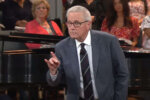Fred Hammond is taking worship music to a new level with his contemporary urban sound in the process he’s teaching the whole church how to praise God with abandon.
In the middle of a cold front sweeping the northeast, Detroit isn’t very inviting. At 14 degrees, it isn’t snowing, but the cars are still covered with a messy mélange of old snow, dirt and salt that all are part of the winter season here. The gray skies and aging buildings make a gloomy day seem even gloomier.
But despite the inclement weather, a visitor can be only so melancholy about the town. After all, this is Detroit–where Henry Ford, Ransom Olds, Louis Chevrolet, and John and Horace Dodge built their automobile empires; where Berry Gordy founded Motown Records and the famous “Detroit Sound” in the 1960s. Few old enough to remember can forget “Shop Around,” “Please, Mr. Postman” and “Heat Wave”–all made famous by native Detroiters.
It was against this backdrop that gospel artist Fred Hammond grew up–where great musicians seemed to grow on trees and innovation was a way of life. In those days when Hammond was just a kid, fresh soulful melodies seemed to ring constantly in his ears–songs his strict Apostolic church wouldn’t let him sing because they were too “bluesy.”
But a grown-up Hammond isn’t so concerned about what the old-fashioned church mothers might say. Motown has moved away, and the automobile industry has long faced stiff competition from foreign manufacturers. But a fresh sound is still coming out of Detroit, and native son Hammond is behind it, upwardly mobile and doggedly staying that way.
Fred Hammond and his vocal ensemble Radical for Christ have practically defined urban praise and worship. Their most recent release, Purpose by Design, hovered comfortably at No. 1 on Billboard’s gospel charts for six weeks after its March release. His previous disc, Pages of Life, went platinum in 1999, selling more than 1 million copies.
It seems as if Hammond has found his niche. After more than 10 years as an artist with the contemporary gospel group Commissioned, Hammond now sees that he was born to be a worshiper–and he loves leading people into God’s presence.
Playing for the People
At Face to Face Productions in the Detroit suburb of Southfield, Hammond relaxes in his studio. Cuts from his latest project filled the giant speakers just moments before, and the worshipful ballads still hang in the air. Dressed in comfortable jeans and a plaid shirt, Hammond seems quite boyish despite his 39 years. Music, he says, is almost always ringing in his ears.
“When I was a kid, I was always tapping to beats. I was always disruptive in school,” Hammond says. “I was always hitting on something [or] trying to make a guitar out of straw and a piece of string. There’s always music going on in my mind.”
But the music going on in his mind didn’t fit the conservative church he grew up in–Greater Grace Temple–an affiliate of the Pentecostal Assemblies of the World. He played drums and bass and sang in the church choir. But in those days, he says, there was no such thing as “music ministry,” and Pentecostal music didn’t extend beyond three-finger chords.
“Back then, the struggle was that the style the [young musicians] loved and learned how to play didn’t fit the church. If the pianist or the keyboardist played certain chords, the old mothers or the pastor would say: ‘Don’t play that jazz. Play these little three-finger chords.’
“[Blues songwriter] Thomas Dorsey played what he knew, and ‘Precious Lord’ came out of that, but they called it bluesy. They scorned him for it.”
Hammond was persecuted too, if not verbally then financially. While his teen-age friends were playing at clubs and making $700, $1,000 or $1,200 a week, Hammond was working as a car porter at the local Oldsmobile dealership making $70 to $80 a week. He turned down secular gigs and reluctantly stayed faithful to church music.
It wasn’t until 1981 when the Winans released their first album, Introducing the Winans, that Hammond knew he could make music his career. He had grown up with the quartet and knew their music.
“They had local records, and they sounded local,” he says. “Then when they had this professional-sounding record–and I knew those guys, and they were out there doing
something. That’s when I knew I could do this.”
Having earned a reputation as one of the best bassists in Detroit, Hammond landed a job playing for the Winans, touring with them for about two years and learning the ins and outs of the music business. While the Winans blazed some trails in contemporary gospel music, 21-year-old Hammond was envisioning a group with an even more youthful sound.
He shared his idea with his “partners” from high school, who all played instruments and sang together as teen-agers, and the result was Commissioned. Formed in 1983, the group set out to record its first record–which Hammond’s mother flatly refused to support.
Mildred Hammond and her late husband, who died when Fred was 9, had planned for their three sons to go to college, she says. Music was supposed to be a hobby, not a career. But when Fred brought her a copy of Commissioned’s first song, “Tis So Sweet,” God spoke to her as the music played.
“The Lord said, ‘I have My hand on him in this, so help him,'” she says. She gave the group what money she could, then began helping to raise the rest. By 1985 Commissioned had released its first record, I’m Going On. The public loved the music but reeled at the sight of six young men wearing denim jackets and jeans on the cover.
“I think that year [gospel artists] Richard Smallwood, the Winans, Douglas Miller, Al Green and Jesse Dixon all had on black tuxedos on their album covers,” Hammond says. “Then we came out with Guess Jeans, leather coats–just regular clothes. In gospel what you wore was a major statement. You were what you wore.”
But the music won the crowds. Nominated for three Grammy awards, two Soul Train awards and a Dove award within six years, Commissioned seemed to hit the jugular for contemporary gospel. By 1992 the group had released seven top-selling albums–but Hammond was sensing a change in the seasons.
The Songs God Loves
While on tour in 1993, Hammond says he had a vision in which God was sitting on His throne.
“Beside Him was a very special
vault. It was a vault of songs, and in the vault of songs there was a very special vase,” he says. “And He took it out, and He poured it. He poured out the songs, and He said, ‘These are songs I really love.'”
At the time, Hammond says, he didn’t know anything about praise and worship music. In the African American church, there was “testimony service,” he says, not
praise and worship. A few months later, Hammond had another vision.
“[God] said there was a season from, like, 1972 to 1992. There were popular people, popular music ministers, popular groups and popular things that ministered for that season. And He said from 1993 there was a new season. And everybody who thinks in this [old] season won’t make it in the next season.
“I didn’t know [what would mark the new season] at the time. But I did know it had something to do with that vault of songs. And the vault of songs had a lot to do with how you saw God and how you thought, and a lot of people couldn’t think any differently.”
Hammond wanted to prepare Commissioned for the coming season, but he says it was difficult for the others to trust him as their leader. God had to remind him that there were many miracles Jesus couldn’t do because of the people’s unbelief.
“I knew what God called me to be, but they didn’t believe it,” Hammond says. “So what did Jesus do? He got His guys, and they booked. So what did I have to do? I had to book.”
It was 1993, and Hammond–hoping to learn more about praise and worship–went to a music conference in Detroit hosted by the charismatic church he had been attending. The pastor asked him to lead praise and worship for the meetings. Not really knowing how, Hammond begged him to find someone else.
Hammond had recently released Deliverance, and he simply sang cuts from the record. “It clearly wasn’t praise and worship,” he says. “So I made a fool out of myself, basically.”
Later that evening one of the ministers leading the conference prophesied to Hammond.
“‘You’ll never be complete until you do praise and worship,'” Hammond remembers him saying. “‘You do it the way you’re supposed to do it. Do it with the things inside of you–every beat, every note and chord that you ever grew up with. You need to do it that way.’
“And I was like, ‘Yeah!'”
That started Hammond on a yearlong study of praise and worship music. His current pastor, Bishop Andrew Merritt of Straight Gate church, says God was transforming Hammond from an entertainer to a worshiper. Hammond devoured any teaching tape or book he could find on praise and worship.
“I would go after anything that had the flavor and the heart that this new season was going to offer,” he says. “No one thought they wouldn’t be around for the next season–me included. Especially since I saw the vault of songs. He poured it on me. I was ready. But there was a season of just…finding what moved God’s heart.”
During his last year with Commissioned in 1993, Hammond started a 30-person choir. The
group met in a little garage in Detroit and struggled for a year, rehearsing, praying and performing in the city. But before long Hammond believed the choir had stopped trying to excel.
“I started feeling like we were being held back,” he says. “And the Lord said: ‘OK, take the hand that sups up and get rid of them. But everybody who drinks like a dog, everybody who’s hungry for this, you keep.’ So it narrowed down to about 12 people.”
As the streamlined group began working on their first project, Hammond says songs just began to come. But because he had wrestled with difficulty reading since childhood and never developed good study skills, the lyrics for the songs had to be revealed to him.
“The songs that came were songs [God] directed me to in the Word–where He would feed me just out
of the blue,” he says.
“When I was writing these songs, I wasn’t pulling them
ver
batim out of the Bible. I had to have a revelation on them. ‘We’re blessed in the city / We’re blessed in the field’–we know that comes from Deuteronomy,” Hammond says.
“But, ‘We’re blessed when we come and when we go / We cast down every stronghold / Sickness and poverty must cease / And the devil is defeated’–those are all the things that were just in my spirit,” he explains. “Those are the songs I would write, and tears would fill my eyes because I wrote it.”
Songs From the Vault
In 1995, Hammond and Radical For Christ recorded The Inner Court in the garage at Face to Face with “raggedy microphones and makeshift chords,” he says. The echo from the garage–which now houses Fred’s two jet skis and a Corvette–gave the disc an ethereal quality. Listeners loved it.
“They were like: ‘What is this? I like it,'” Hammond says. “It was like they sat down to a food that they had never eaten before, and they were like: ‘What do you call this again? Praise and worship?'”
Inner Court got the attention of executives at Integrity Music and led to a partnership to help the company develop a praise and worship line for the urban church. Praise in the House released on the label in 1995 and did “extremely well,” says Jerrel Gilliam, manager of Urban Praise at Integrity. Out of that grew Integrity’s In the House series, which in September
will release its sixth project, Faith
in the House, a live recording from
Hammond’s church, Straight Gate.
Though he had one critically acclaimed project under his belt, Hammond was still “in school.” This time he was learning about the song of the Lord, which he says is a prophetic song birthed out of worship. His pastors at the time, Bishop Wayne T. and Beverly Jackson, had begun calling him “minister” Fred Hammond, and he was evolving into much more than a musician.
“I was working in ministry at Great Faith Ministries here in the city, and I would watch pastor Jackson minister to the people, and the Lord would give me songs,” Hammond says.
“One time [Jackson] was ministering down on the floor, and the organist started playing these chords. I don’t even know if he was conscious of what he was playing. And I told him: ‘Just stay there.
Don’t change. Just stay there and keep doing that over and over again.’
“And when I got up [to the platform], the Lord said: ‘No weapon formed against you shall prosper / It won’t work / God will do what He said He would do / He’s not a man that He should lie / He will come
through.’
“These words came as if I’d seen them written before, like I knew the song.”
“No Weapon”–on Hammond’s second album, Spirit of David–has become one of his signature cuts and earned him a Dove Award nomination in 1997.
Hammond’s latest release, Purpose by Design, opens with him screaming, “I want my destiny!” against funky acoustic guitar licks. The project is partly meant to encourage believers to “stay in their lane”–or do what they are called to do–he says, but he’s also making a statement based on his own experience.
So many people had been calling him to preach that it had become a distraction from what he believed he should be doing. He had to remind himself that his calling is to be a psalmist–and he doesn’t see preaching in his future.
One thing he does see, however, is his own record label–F. Hammond Music Series–which in the fall will debut a praise and worship compilation as its first release. He says the label will continue to take “vertical music” to new levels with music ministers such as Joann Rosario and Israel Houghton.
In addition, he wants to branch off into other forms of creative media, including feature films. It wouldn’t bother him a bit if he became known as the innovator and entrepreneur of gospel music.
“Although God has blessed us, I need something that catapults me into the stratosphere financially. I don’t need to be just pretty well off. I need to be wealthy, extremely wealthy, and I don’t even mind saying it.
“I want to set up big outdoor concerts where we actually feed the people–feed them naturally and spiritually; sing and don’t do it shabby–do it like the world would do it.
“I want you to be able to say, ‘If you want to see something, experience something you’ve never experienced, you can experience it with this guy Fred Hammond and his ministry.'”
Hammond says he wishes he were one of those people who didn’t have to experience what he sings about, but he hasn’t been so fortunate in that way. He says he’s noticed that everyone who writes songs “from the vault” has been through a lot of pain.
“‘No Weapon’ is a song I have to keep singing–songs like ‘No Way You Won’t Lose’–because [people] constantly try to say I’m going to lose. I can feel the heat around me a lot of times,” he says. “But the Lord is in there with me, and I always come out on the other end, and there’s always a song or an album that comes out of it.
“And people say, ‘It’s like you were there when I felt this…or when I did that.’ I pretty much know how that feels. I might not have been on the street in your city, but the street in my city is the same way.”
A dozen handwritten declarations adorn a wall at Face to Face: “Debt-free”; “Arenas filled to capacity”; “Altars filled to capacity”; “Thousands and thousands of souls saved.” Many of these already have come to pass.
But there is more to come, the way Hammond is thinking.
Detroit’s new native son has much in common with the city’s great music innovators who inspired him as a boy with their unprecedented sound. He too is shaping and defining a musical direction both for himself and for those who come after him in the “new season.”
For Hammond, however, the most important thing is that his ear is tuned to God’s voice. He’s already seen how much God can do with a mustard seed of faith–and the soulful music’s still ringing in his ears like it did when he was a child.
The new season in song is coming, he says, though he doesn’t venture to offer details about it.
“The seasons are getting shorter. And people who don’t have a song for the new season will not survive. God’s stuff just doesn’t get old, so that vault of songs hasn’t run out yet. He’s still pouring it out. And there are still songs that He loves.”
Adrienne S. Gaines is an associate editor for Charisma and Ministries Today magazines. She visited Detroit in January to interview Fred Hammond at Face to Face Productions.
PHOTOS BY RON KOCH FOR CHARISMA
Are You Ready to Rap With Jesus?
Music Insiders say God is about to empower Hip-Hop to reach the masses.
In the last 20 years, rap has taken the mainstream by storm. Time magazine reported that in 1998, rap and hip-hop outsold country music, which had been America’s top-selling genre. And at a 31 percent jump, rap showed one of the biggest sales increases of any genre that year.
Christian rappers know the mainstream stats well, but so far the genre isn’t big enough to be tracked separately by SoundScan, which compiles national sales figures for the music industry. Yet some insiders see a new day dawning for Christian rap and hip-hop.
Gospel artist Montrel Darrett believes 2000 marks the beginning of a “prophetic millennium” in which Jesus speaks hip-hop. Rap, he believes, reflects God’s divine creativity. But now it’s time for the art form to be reclaimed.
“I believe [rap] was something given by God as a [way] for kids in the inner city to release tension,” Darrett says. “But I believe in 2000 God has ordained this time for hip-hop to come back to Him. And I believe it’ll be bigger in gospel than it is in the secular industry.”
Darrett, 29, says the youth are the future of the church, but a whole generation is being lost to the mainstream because there’s no musical outlet for them.
“The youth are the strength of the church,” Darrett says, “but the Bible also says the elders know the way.” Both the young and old need to “lay before God and find out where the next move is,” he says. Rev. Eugene Rivers, pastor of the Azusa Christian Community Center in Boston, believes each generation is called to lead the generation coming under them, adding that without leadership the younger generation will make the same mistakes as the older. “The young, without strong direction, will simply repeat in a different guise the mistakes made by their predecessors,” Rivers told Neopolitique.
“Youth are more at risk now than they were 30 years ago because the world is very different; the world is more violent, and young people are less optimistic about the future.”
Perhaps that’s why the volume is being raised on rap. Though the origins of rap and hip-hop are in the black community, 70 percent of hip-hop albums are purchased by whites, Time reported. And the music–though laced with the language of America’s inner city–is reaching an audience as far away as England, France and Russia.
“People who feel marginalized identify with hip-hop. They see someone speaking for those who are put down,” says Benson Frazer, a Regent University professor who teaches a class on hip-hop culture.
But the vulgarity in much of mainstream rap music is causing some industry insiders to call for rappers to dig deeper for better lyrics. Christian rap could be a powerful alternative.
“The church should see the points where we have something in common, Frazer says. “The mantra is ‘keeping it real.’ These kids are looking for a deeper sense of reality. People need to hear the cry that’s underneath the music.”
Knolly Williams, president and CEO of Grapetree Music Group, a leading producer of Christian rap, believes the genre’s mainstream success has been a divine setup. Christian rappers, he says, know the Answer to the problems that mainstream artists are enraged about. “I think the mainstream community has built the fan base for us to come in and fill the need that people have,” says Williams, 30.
But for now younger rappers still complain about not getting enough airplay and of not being accepted in some churches. Yet veteran artists encourage them to keep their priorities in order.
“I never looked for the approval of the church. I looked for the approval of those in spiritual authority over me, and I looked for the approval of God,” says Michael Peace, one of the forerunners in Christian rap and currently pastor of urban ministries at Bethel Full Gospel Church in Rochester, New York.
Dozens of Christian rappers have emerged since Peace’s early days, though many are underground, meaning their records aren’t tracked by SoundScan. Many of the artists have come out of lives of crime and drug addiction, and they’re desperate to reach their own, Peace says.
Groups such as Cross Movement, GRITS and Gospel Gangstaz have made huge headway in the Christian market, with GRITS receiving a Dove Award in April. Chris Williamson, pastor of Strong Tower Bible Church in Franklin, Tennessee, and a former member of the rap group Transformation Crusade, believes one big hit could send the genre soaring, just as Kirk Franklin’s “Stomp” sent contemporary gospel through the roof.
But the key is in seeking God for the sound, he says. “On the day of Pentecost, the sound of a mighty, rushing wind filled the upper room, and it got the attention of people outside the walls,” he says. “If we can get some people to rely on heaven…[for] their sound, they’ll have people coming from all over the world to hear it.”






Leave a Comment
You must be logged in to post a comment.